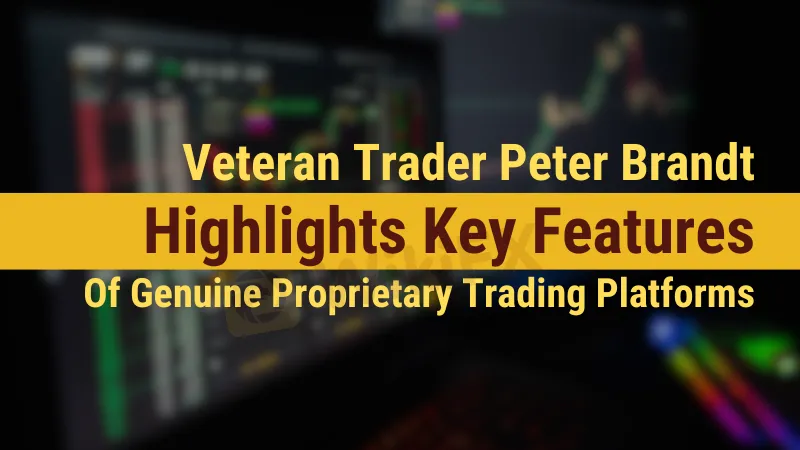简体中文
繁體中文
English
Pусский
日本語
ภาษาไทย
Tiếng Việt
Bahasa Indonesia
Español
हिन्दी
Filippiiniläinen
Français
Deutsch
Português
Türkçe
한국어
العربية
Veteran Trader Peter Brandt Highlights Key Features of Genuine Proprietary Trading Platforms
Abstract:Experienced trader Peter Brandt has issued a critical alert, emphasizing the characteristics that define authentic proprietary trading platforms. This guidance comes as a response to the increasing number of deceptive platforms presenting themselves as genuine proprietary trading firms.

In a recent and insightful announcement, experienced trader Peter Brandt has issued a critical alert, emphasizing the characteristics that define authentic proprietary trading platforms. This guidance comes as a response to the increasing number of deceptive platforms presenting themselves as genuine proprietary trading firms. Brandt, who possesses a wealth of trading experience, aims to equip traders with knowledge to identify and avoid potential scams in the trading industry.

Proprietary trading, a term often associated with financial institutions, involves the use of a firm's capital to engage in financial transactions, aiming to generate profits directly from market activities. Unlike traditional client-based trading, proprietary trading allows these institutions to reap the full benefits of their investments. Legitimate proprietary trading firms are known for offering traders the opportunity to maximize earnings, keeping all profits earned from such trades.
Brandt's criteria for identifying a legitimate proprietary trading firm are straightforward and unambiguous. According to him, true proprietary trading platforms should never impose fees on their traders. Additionally, these platforms should provide actual, real dollar funding, maintain a set drawdown from the initial funding level, and offer unrestricted freedom in terms of trading style and market selection. Brandt firmly believes that any platform not adhering to these standards should be considered dubious.
The veteran trader's assertions, however, have sparked diverse reactions among his followers, exceeding 700,000 in number. A user named Trader Nomad expressed skepticism about Brandt's claim regarding fee-free operations, urging for more comprehensive research. Another follower disagreed with Brandt's business model but acknowledged that if these so-called scam platforms are rewarding successful traders, their legitimacy could be considerable.

Despite these differing viewpoints, many in the trading community have lauded Brandt for his efforts to delineate the differences between legitimate and fraudulent proprietary trading firms. This distinction is crucial for new and seasoned traders alike, as it empowers them to make informed decisions and protects their interests in an industry where transparency is not always the norm.
Brandt's advisory serves as a valuable resource for traders worldwide, guiding them in navigating the complex and often opaque world of proprietary trading. His emphasis on the absence of fees, real funding, no restrictions on trading style, and a set drawdown level provides a clear framework for traders to assess the credibility of proprietary trading platforms. As the trading landscape continues to evolve, such insights from seasoned professionals are indispensable in promoting a safer and more reliable trading environment.
For more information and updates on trading and investment strategies, stay tuned to our platform, where expertise meets reliability in the world of finance.

Disclaimer:
The views in this article only represent the author's personal views, and do not constitute investment advice on this platform. This platform does not guarantee the accuracy, completeness and timeliness of the information in the article, and will not be liable for any loss caused by the use of or reliance on the information in the article.
Read more

Georgia Man Charged in Danbury Kidnapping and Crypto Extortion Plot
Georgia man James Schwab charged in Danbury kidnapping tied to $230M crypto heist. Plot targeted couple for ransom after Miami altercation with son.

Bybit Shuts Down NFT Marketplace Amid Crypto Market Downturn
Bybit announces the closure of its NFT marketplace, citing efforts to streamline offerings. Discover the latest trends in the declining NFT market and its shift to utility-based growth.

Galaxy Digital Settles $200M in Luna Token Manipulation Case
Galaxy Digital pays $200M to settle Luna token manipulation probe by NY regulators, linked to TerraUSD’s 2022 crash, impacting crypto market stability.

April Forex Trends: EUR/USD, GBP/USD, USD/JPY, AUD/USD, USD/CAD Insights
Know April’s forex seasonality trends for EUR/USD, GBP/USD, USD/JPY, AUD/USD, and USD/CAD. Historical insights and key levels to watch in 2025.
WikiFX Broker
Latest News
Exposing the Top 5 Scam Brokers of March 2025: A Closer Look by WikiFX
Gold Prices Climb Again – Have Investors Seized the Opportunity?
Webull Launches SMSF Investment Platform with Zero Fees
Australian Regulator Warns of Money Laundering and Fraud Risks in Crypto ATMs
The Withdrawal Trap: How Scam Brokers Lure Victims into Paying More
FCA to Investors: Think Twice Before Trusting These Brokers
Trump\s tariffs: How could they affect the UK and your money
Trump gambles it all on global tariffs he\s wanted for decades
HTFX Spreads Joy During Eid Charity Event in Jakarta
How Will the Market React at a Crucial Turning Point?
Currency Calculator







